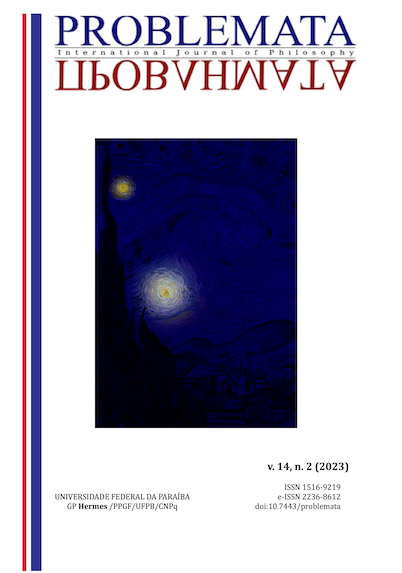THE METAPHYSICAL FUNDAMENTAL POSITION AND THE EXPLORATION OF THE GUIDING QUESTION OF METAPHYSICS ACCORDING TO MARTIN HEIDEGGER
DOI:
https://doi.org/10.7443/problemata.v14i2.65986Keywords:
Martin Heidegger, Dasein, metaphysical fundamental position, Guiding question of metaphysics, Grounding question of metaphysicsAbstract
This article intends to investigate and circumscribe the Heideggerian concepts of “metaphysical fundamental position” and “guiding question of metaphysics” and what the exploration of the latter means. To do so, we approach the metaphysics understood from the first beginning of Western philosophical thought as the question for the principle of all things (ἀρχή), a question that makes visible the beings as such and in totality and does so from the ontic domain of beings according to Heidegger. At this point, we enter into the clarification of what is the guiding question of metaphysics (what are beings?) and what is the metaphysical fundamental position (the lack of exploration of the guiding question). That said, we set out to investigate what Heidegger understands as the need to explore the guiding question of metaphysics. We show that the guiding question duly explored reveals a more original question that supports and leads it: the fundamental question of metaphysics (what is being?). Finally, and not least, we point out that the fundamental question of metaphysics is also the question of what founds the internal possibility of the openness of being, a path that leads us to the transcendence of human Dasein.
Downloads
References
HEIDEGGER, Martin. A Essência da Liberdade Humana: Introdução à Filosofia. Trad. Marco Antonio Casanova. Rio de Janeiro: Via Verita, 2012. Original: Vom Wesen der menschlichen Freiheit: Einleitung in die Philosophie, GA, Bd. 31.
HEIDEGGER, Martin. Contribuições à Filosofia (Do Acontecimento Apropriador). Trad. Marco Antonio Casanova. Rio de Janeiro: Via Verita, 2015. Original: Beiträge zur Philosophie (Vom Ereignis), GA., Bd. 65.
HEIDEGGER, Martin. Introdução à Filosofia. Trad. Marco Antonio Casanova. 2. ed. São Paulo: Editora WMF Martins Fontes, 2009. Original: Einleitung in die Philosophie. GA., Bd. 27.
HEIDEGGER, Martin. Introdução à Metafísica. Trad. Emmanuel Carneiro Leão. 4. ed. Rio de Janeiro: Tempo Brasileiro, 1999. Original: Einführung in die Metaphysik. GA., Bd. 40.
HEIDEGGER, Martin. Marcas do Caminho. Trad. Enio Paulo Giachini, Ernildo Stein. Petrópolis: Vozes, 2008. Original: Wegmarken, GA., Bd. 9.
HEIDEGGER, Martin. Nietzsche. Volume único. Trad. Marco Antonio Casanova. 2. ed. Rio de Janeiro: Forense, 2014a. Original: Nietzsche I. GA., Bd 6.1.
HEIDEGGER, Martin. Os Conceitos Fundamentais da Metafísica: Mundo – Finitude – Solidão. Trad. Marco Antonio Casanova. 2. ed. Rio de Janeiro: Forense Universitária, 2011. Original: Die Grundbegriffe der Metaphysik. Welt – Endlichkeit – Einsamkeit. GA, Bd. 29/30.
HEIDEGGER, Martin. Ser e Tempo. Edição bilíngue. Trad. Fausto Castilho. Campinas, SP: Editora da Unicamp; Petrópolis, RJ: Editora Vozes, 2014b. Original: Sein und Zeit, GA., Bd. 2
Downloads
Published
Issue
Section
License
Copyright (c) 2023 Eduardo Quelis de Souza

This work is licensed under a Creative Commons Attribution 4.0 International License.
Authors who publish with this journal agree to the following terms:
- Authors retain copyright and grant the journal right of first publication with the work simultaneously licensed under a Creative Commons Attribution License that allows others to share the work with an acknowledgement of the work's authorship and initial publication in this journal.
- Authors are able to enter into separate, additional contractual arrangements for the non-exclusive distribution of the journal's published version of the work (e.g., post it to an institutional repository or publish it in a book), with an acknowledgement of its initial publication in this journal.
-
- Authors are permitted and encouraged to post their work online (e.g., in institutional repositories or on their website) prior to and during the submission process, as it can lead to productive exchanges, as well as earlier and greater citation of published work (See The Effect of Open Access).





